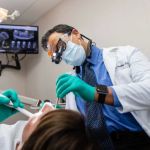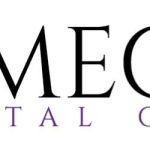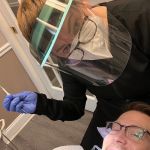Why Flossing Is Just as Important as Brushing Your Teeth
As someone who has always taken great pride in my dental hygiene, I’ve spent a lot of time brushing my teeth. For years, I believed that brushing alone was enough to maintain good oral health. That was until I learned that flossing is just as important as brushing. It’s not just an added extra; it’s an essential part of keeping your teeth and gums healthy. Here, I’ll take you through why flossing deserves just as much attention as brushing and how it plays a crucial role in overall oral care.
The Critical Role of Flossing
Let me take you back to a conversation I had with my dentist, Dr. Lee, a few years ago. I had just finished my regular cleaning, and I mentioned how I’ve always felt my brushing routine was sufficient. Dr. Lee smiled and said, “You’re doing great with brushing, but how often do you floss?” At that moment, I realized I had been neglecting something that could make a big difference in my oral health.
Flossing removes plaque and food particles that get stuck between your teeth, where toothbrush bristles can't reach. This is crucial because plaque buildup can lead to tooth decay and gum disease. In fact, the American Dental Association (ADA) recommends flossing at least once a day to maintain optimal oral hygiene.
Flossing vs. Brushing: What’s the Difference?
Many people mistakenly believe that brushing alone is enough to keep their teeth clean, but here’s why that’s not the case. When we brush, we clean the outer and inner surfaces of our teeth. However, between the teeth is a space that a toothbrush just can’t reach. Plaque accumulates in these areas, and if left unchecked, it can lead to cavities, gum disease, and bad breath.
Flossing targets these hard-to-reach areas. By sliding a thin piece of floss between your teeth, you physically remove plaque and debris, preventing it from hardening into tartar, which can only be removed by a dentist or hygienist. This is why flossing is a game-changer when it comes to preventing tooth decay and gum problems.
How Flossing Helps Prevent Gum Disease
I used to think that gum disease was something that only older adults had to worry about, but I’ve come to learn that it can affect anyone, especially if they don’t floss regularly. Gum disease, or periodontal disease, starts when plaque builds up along the gum line. If this plaque isn’t removed, it can cause the gums to become inflamed, leading to gingivitis, the earliest stage of gum disease.
At this stage, the gums might be swollen, bleed when brushing, and feel tender. If left untreated, gingivitis can develop into more serious gum disease, which can lead to tooth loss. Flossing helps keep your gums healthy by removing the plaque and bacteria from between your teeth, where your toothbrush can’t reach. By flossing daily, you reduce your risk of developing gum disease and ensure that your gums stay firm and healthy.
My Personal Experience with Flossing
Before I started flossing regularly, I noticed that I sometimes had bleeding gums, especially after brushing. I brushed twice a day and thought I was doing everything right. But once I introduced flossing into my routine, I quickly saw a change. The bleeding stopped, my gums felt less tender, and I noticed that my breath was fresher. This personal experience was enough to convince me that flossing was essential for optimal oral health.
Flossing Tips for Beginners
If you’re new to flossing, you might be wondering how to get started. It’s easier than you think! Here are a few tips that helped me:
- Start by using about 18 inches of floss. Wrap the ends around your middle fingers, leaving a small section to work with.
- Gently guide the floss between your teeth using a back-and-forth motion. Be careful not to snap the floss, as this can harm your gums.
- Curve the floss around the base of each tooth, making sure to slide beneath the gumline.
- Repeat for all your teeth, using a fresh section of floss for each gap to avoid transferring bacteria.
Why You Should Make Flossing a Daily Habit
I’ll admit, when I first started flossing, I didn’t always stick with it. Sometimes I’d skip a day, thinking it wasn’t a big deal. However, I quickly realized that consistency is key. Just like brushing, flossing should be a part of your daily routine. It doesn’t take long—just a couple of minutes—and the benefits are well worth the effort. Once flossing becomes a habit, you’ll notice a significant improvement in your oral health.
Flossing Is Not Just for Your Teeth
Interestingly, flossing doesn’t only benefit your teeth. It also has a positive impact on your overall health. Research has shown that gum disease is linked to other serious conditions, such as heart disease, diabetes, and respiratory issues. By flossing regularly, you not only protect your teeth and gums, but you also reduce the risk of these health problems. It’s one of the simplest and most effective ways to improve your overall well-being.
Flossing Myths You Should Know About
As I’ve become more dedicated to flossing, I’ve come across some common myths that people often believe. Let’s debunk a few of them:
- Myth 1: “Flossing causes gum damage.”
Fact: If done properly, flossing is safe and beneficial. It’s important to be gentle and avoid snapping the floss between your teeth. - Myth 2: “Flossing isn’t necessary if you have a toothbrush with a tongue cleaner.”
Fact: A toothbrush can’t clean between your teeth, which is why flossing is still necessary. - Myth 3: “Flossing is only important when you have food stuck in your teeth.”
Fact: Flossing helps prevent plaque buildup, which can lead to long-term issues even without food stuck in your teeth.
Flossing Tools: Which One Should You Use?
If regular string floss doesn’t feel comfortable for you, there are plenty of alternatives available. Floss picks, interdental brushes, and water flossers can all be effective at cleaning between your teeth. It’s important to choose a tool that you’re comfortable with and that works best for your needs. For example, if you have braces, a water flosser might be more effective than traditional floss.
In my case, I personally love using floss picks because they’re quick and easy. I keep them in my bag for on-the-go use and at home to maintain a consistent routine. However, it’s always good to ask your dentist for recommendations based on your individual needs.
Takeaway: Flossing Complements Brushing
Ultimately, brushing and flossing go hand in hand. While brushing removes plaque from the surface of your teeth, flossing ensures that the spaces between your teeth are just as clean. By incorporating both into your daily routine, you’re giving your teeth and gums the best chance for a lifetime of health. So, if you haven’t been flossing, I encourage you to start today and see the difference it makes in your overall oral health.







 Sugar Hill Family Dental4.0 (83 review)
Sugar Hill Family Dental4.0 (83 review) Cazes Family Dentistry LLC4.0 (61 review)
Cazes Family Dentistry LLC4.0 (61 review) Omega Dental Care4.0 (74 review)
Omega Dental Care4.0 (74 review) Dr. Stephen M. Buchanan, DDS3.0 (10 review)
Dr. Stephen M. Buchanan, DDS3.0 (10 review) Samson Wahl & Associates5.0 (6 review)
Samson Wahl & Associates5.0 (6 review) Fair Lawn Periodontics & Dental Implants4.0 (191 review)
Fair Lawn Periodontics & Dental Implants4.0 (191 review) The Importance of Oral Health Education During Pregnancy for a Healthy Pregnancy
The Importance of Oral Health Education During Pregnancy for a Healthy Pregnancy Best Tips for Brushing Your Teeth Properly for Healthy Gums: Essential Techniques for Oral Health
Best Tips for Brushing Your Teeth Properly for Healthy Gums: Essential Techniques for Oral Health Why Skipping Dental Checkups Can Lead to Bigger Oral Health Problems
Why Skipping Dental Checkups Can Lead to Bigger Oral Health Problems Advantages of Porcelain Dental Restorations
Advantages of Porcelain Dental Restorations How Can Diabetes Cause Tooth and Gum Problems? Preventing and Managing Oral Health Issues
How Can Diabetes Cause Tooth and Gum Problems? Preventing and Managing Oral Health Issues Healthy Habits for Promoting Good Oral Health and Hygiene: Tips for a Healthy Smile
Healthy Habits for Promoting Good Oral Health and Hygiene: Tips for a Healthy Smile